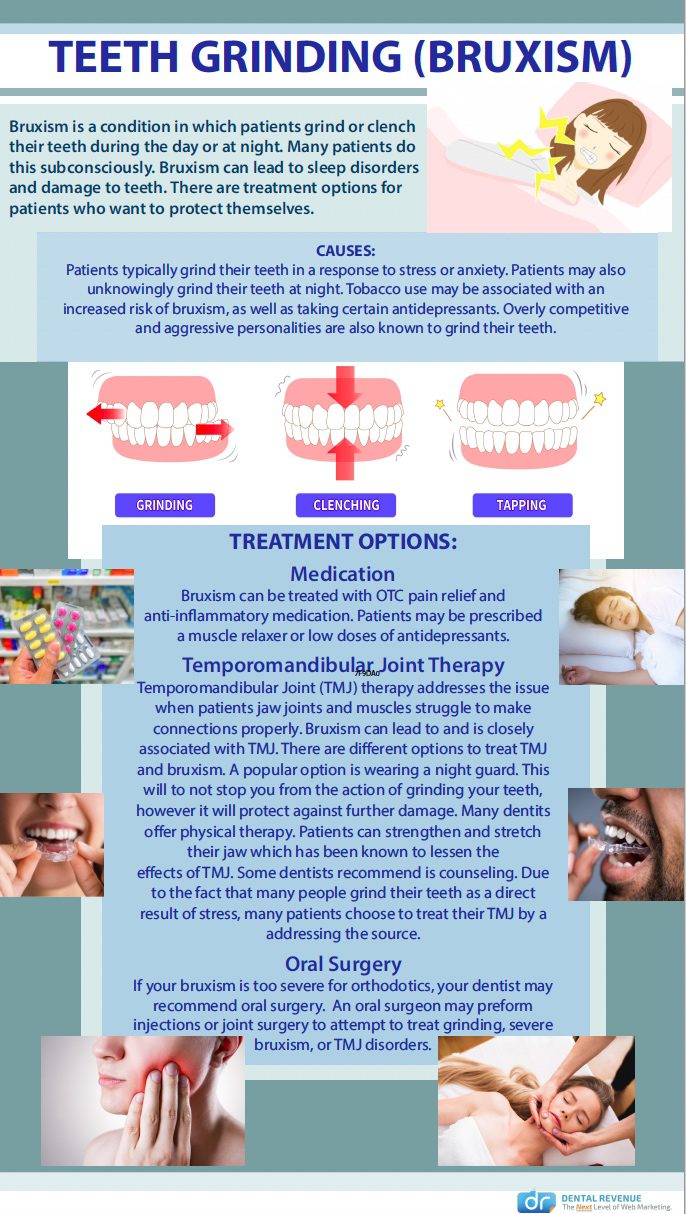Dr. Matthew Moy has advanced training in the diagnosis and treatment of bite-related concerns and common symptoms such as teeth grinding, or bruxism. Although stress can often be a factor in patients who grind their teeth or clench their jaw, in most cases there is an underlying bite problem.
A Dawson-trained dentist in Silver Spring MD, Dr. Moy will evaluate all aspects of your occlusal system. This will include the teeth, the gums, and the jaw joints. One of the main symptoms we see in patients with bruxism is the presence of a TMJ disorder.
The temporomandibular joints, or TMJ, can become dysfunctional due to trauma or an imbalance in the bite that results in muscle tension. This can lead to teeth grinding and a range of other symptoms. Identifying the cause early-on is the key to lasting TMJ treatments that will improve your overall dental health.

Do I Grind My Teeth?
If you think you might grind your teeth, you should contact Dechter and Moy Dentistry. Our dentists will be able to tell if you have been grinding your teeth by examining your mouth. We might also recommend that you get a bite guard or night guard if you are showing signs of grinding your teeth. Dr. Dechter and Dr. Moy will look for the common signs of teeth grinding during your routine dental visits, which can include:
- Worn teeth. Teeth that appear “flat” are due to constant grinding and clenching.
- Chipped and cracked teeth. The pressure that teeth grinding places on biting surfaces can lead to chips, cracks, and damage.
- Changes in the fit of your bite. Over time, teeth grinding can cause the teeth to shift and may impact the function of your bite.
- Clicking or popping jaw. The jaw may jump or pop when opening or chewing as teeth grinding increases muscle tension.
Other signs that you may be grinding your teeth or clenching your jaw can include jaw pain (especially in the morning), a feeling of “tired jaws”, ringing in the ears, neck or shoulder pain, and even headaches. Discuss any symptoms or concerns you have during a routine visit or consultation with one of our Silver Spring dentists.
Treating teeth grinding is important for restoring the stability of your oral health, the function of your bite, and improving your overall comfort.
Teeth Grinding Treatment Options
There are many treatment options when it comes to teeth grinding, From holistic to oral surgery, each one has its benefits and can treat many levels of bruxism. To determine which one will be the most beneficial for your specific case, Dr. Dechter or Dr. Moy will first evaluate the condition of your dental health.
A comprehensive exam and diagnostics will give us a better understanding of your underlying condition and which treatment will work best. We’re looking for the underlying cause of your bruxism, including a TMJ disorder.
Oral Appliance or Night Guard
The most conservative and common medical treatment approach for teeth grinding and jaw clenching is the use of an oral appliance, dental splint, or night guard. A custom-made night guard works to reposition your jaw and allow the jaw muscles to relax while you sleep.
This appliance will fit much like a sports mouthguard. You can also wear it when feeling stressed to prevent teeth grinding. Over time, in the absence of more complex dental concerns, a mouthguard will allow the jaw to function normally and reduce muscle tension and associated pain.
Orthodontics
We may recommend restorative treatments to repair tooth damage or address how your teeth make contact when biting. For patients with malocclusion that is affecting the bite, we offer orthodontic treatment with clear aligners to gently and unnoticeably straighten your teeth. Clear aligners can straighten your bite and realign your jaw in about 12 months.
For more severe cases of teeth misalignment, we will refer you to an orthodontist. An orthodontist will apply dental correction techniques to adjust your biting surfaces so that they make proper contact. This can significantly reduce your teeth grinding habit.
Stress-reduction Techniques
Try the following stress-reduction techniques to help you discover and prevent the underlying issues that are causing your bruxism.
- Practice relaxation and stress-relief techniques such as deep breathing, meditation, or yoga.
- Engage in regular physical exercise to release tension in the body and reduce stress.
- Change up your bedtime routine to promote relaxation over anything else. Do things like take a warm bath, read a book, or listen to calming music before going to sleep. White noise machines also help.
- Use a warm compress on your jaw muscles before bed to relax them and relieve tension.
- Avoid stimulants such as caffeine and nicotine. They can increase stress levels and contribute to teeth grinding.
- Practice good sleep hygiene by establishing a regular sleep schedule. Foster a comfortable sleep environment, and avoiding using electronic devices like cell phones and laptops an hour before bed.
- Practice mindful teeth awareness throughout the day. Set reminders to keep your jaw relaxed and teeth apart whenever you notice tension building up.
- Seek therapy or counseling to address underlying stress or anxiety issues that may be contributing to teeth grinding.
- Seek stress-free alternative therapies such as acupuncture, biofeedback, or cognitive behavioral therapy. All of these can help manage stress and reduce teeth grinding.
Teeth Grinding FAQs
What damage can grinding teeth cause?
Teeth grinding can cause various levels of damage to the teeth, depending on the severity and how frequently it occurs. Grinding teeth can cause future and present issues for teeth and a patient’s health. Short-term effects may include jaw pain, headaches and migraines, sore gums, and wear of the enamel on the teeth.
Long-term effects may include jaw joint problems (TMJ disorder), teeth chipping, permanent indentations and wearing down of the teeth, tooth sensitivity, and severe headaches. Additionally, clenching and grinding teeth can lead to gum recession, erosion of the gums, mobile teeth, and fractured teeth. Keep in mind that tooth enamel does not grow back.
What vitamin deficiency causes teeth grinding?
There is no single vitamin deficiency that has been definitively linked to teeth grinding and bruxism. However, research suggests that deficiencies in vitamin B5 (pantothenic acid) may contribute to bruxism in some cases. Other vitamins, minerals, and nutrients thought to play a role in bruxism include vitamin B12, magnesium, iron, calcium, and omega-3 fatty acids.
Can teeth recover from damage from teeth grinding?
The enamel on your teeth isn’t recoverable if damage occurs because teeth will not heal naturally from grinding damage. Your teeth are your bones, which do not regrow. If you grind your teeth and notice damage, you should see your dentist and get a night guard to prevent any further damage.
You can help prevent future bruxism damage by avoiding clenching or grinding your teeth, which you can accomplish through relaxation techniques such as yoga or meditation. Be mindful and protect your teeth while you sleep or when you are feeling stress.
Fortunately, our dentists at Dechter & Moy Dentistry can repair your teeth from the damage that this issue causes. We can repair worn teeth using restorative dental services such as dental bonding, porcelain veneers, dental crowns, tooth contouring, and orthodontic care. Give us a call today to request an appointment for a teeth grinding consultation. We are here to help!

